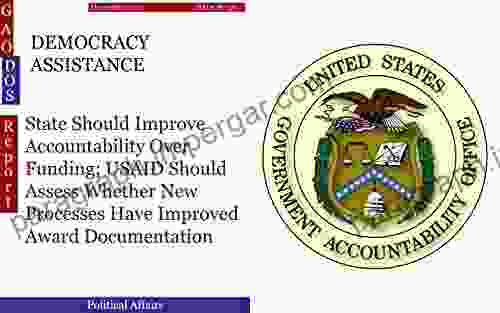State Should Improve Accountability Over Funding, USAID Should Assess Whether It Is Effective

The United States Agency for International Development (USAID) is a federal agency that provides economic and humanitarian assistance around the world. In fiscal year 2018, USAID's budget was approximately $27 billion. The agency's programs are intended to promote economic growth, improve health and education, and support democracy and human rights.
However, there have been concerns about the effectiveness of USAID's programs. A 2017 report by the Government Accountability Office (GAO) found that USAID did not have a clear definition of success for its programs, and that it was difficult to measure the impact of its work. The GAO also found that USAID was not always transparent about its funding decisions, and that it did not have adequate oversight of its programs.
5 out of 5
| Language | : | English |
| File size | : | 8003 KB |
| Text-to-Speech | : | Enabled |
| Enhanced typesetting | : | Enabled |
| Word Wise | : | Enabled |
| Print length | : | 117 pages |
| Lending | : | Enabled |
In response to these concerns, Congress has passed legislation that requires USAID to improve its accountability and transparency. The Foreign Aid Transparency and Accountability Act of 2016 requires USAID to track and report on the results of its programs, and to make its funding decisions more transparent. The act also requires USAID to create a new inspector general position to oversee its programs.
USAID has taken steps to implement the requirements of the Foreign Aid Transparency and Accountability Act. The agency has developed a new performance measurement system, and it has begun to make its funding decisions more transparent. However, USAID still has more work to do to improve its accountability and transparency.
The State Department should continue to work with USAID to improve the agency's accountability and transparency. The State Department should also work with Congress to ensure that USAID has the resources it needs to carry out its mission effectively.
In addition to improving its accountability and transparency, USAID should also assess whether its programs are effective. The agency should conduct rigorous evaluations of its programs to determine whether they are achieving their intended goals. USAID should also use the results of these evaluations to improve its programs.
By improving its accountability, transparency, and effectiveness, USAID can better serve the American people and the people of the world.
Key Findings
- USAID does not have a clear definition of success for its programs, and it is difficult to measure the impact of its work.
- USAID is not always transparent about its funding decisions, and it does not have adequate oversight of its programs.
- Congress has passed legislation that requires USAID to improve its accountability and transparency.
- USAID has taken steps to implement the requirements of the Foreign Aid Transparency and Accountability Act, but it still has more work to do.
- The State Department should continue to work with USAID to improve the agency's accountability and transparency.
- USAID should also assess whether its programs are effective by conducting rigorous evaluations.
Recommendations
- USAID should develop a clear definition of success for its programs, and it should develop metrics to measure the impact of its work.
- USAID should make its funding decisions more transparent, and it should create a new inspector general position to oversee its programs.
- The State Department should continue to work with USAID to improve the agency's accountability and transparency.
- The State Department should also work with Congress to ensure that USAID has the resources it needs to carry out its mission effectively.
- USAID should conduct rigorous evaluations of its programs to determine whether they are achieving their intended goals.
- USAID should use the results of these evaluations to improve its programs.
USAID is a vital part of the U.S. foreign aid program. The agency provides economic and humanitarian assistance around the world, and its programs are intended to promote economic growth, improve health and education, and support democracy and human rights. However, there have been concerns about the effectiveness of USAID's programs. A 2017 report by the Government Accountability Office (GAO) found that USAID did not have a clear definition of success for its programs, and that it was difficult to measure the impact of its work. The GAO also found that USAID was not always transparent about its funding decisions, and that it did not have adequate oversight of its programs.
In response to these concerns, Congress has passed legislation that requires USAID to improve its accountability and transparency. The Foreign Aid Transparency and Accountability Act of 2016 requires USAID to track and report on the results of its programs, and to make its funding decisions more transparent. The act also requires USAID to create a new inspector general position to oversee its programs.
USAID has taken steps to implement the requirements of the Foreign Aid Transparency and Accountability Act. The agency has developed a new performance measurement system, and it has begun to make its funding decisions more transparent. However, USAID still has more work to do to improve its accountability and transparency.
The State Department should continue to work with USAID to improve the agency's accountability and transparency. The State Department should also work with Congress to ensure that USAID has the resources it needs to carry out its mission effectively.
In addition to improving its accountability and transparency, USAID should also assess whether its programs are effective. The agency should conduct rigorous evaluations of its programs to determine whether they are achieving their intended goals. USAID should also use the results of these evaluations to improve its programs.
By improving its accountability, transparency, and effectiveness, USAID can better serve the American people and the people of the world.
5 out of 5
| Language | : | English |
| File size | : | 8003 KB |
| Text-to-Speech | : | Enabled |
| Enhanced typesetting | : | Enabled |
| Word Wise | : | Enabled |
| Print length | : | 117 pages |
| Lending | : | Enabled |
Do you want to contribute by writing guest posts on this blog?
Please contact us and send us a resume of previous articles that you have written.
 Book
Book Novel
Novel Page
Page Chapter
Chapter Text
Text Story
Story Genre
Genre Reader
Reader Library
Library Paperback
Paperback E-book
E-book Magazine
Magazine Newspaper
Newspaper Paragraph
Paragraph Sentence
Sentence Bookmark
Bookmark Shelf
Shelf Glossary
Glossary Bibliography
Bibliography Foreword
Foreword Preface
Preface Synopsis
Synopsis Annotation
Annotation Footnote
Footnote Manuscript
Manuscript Scroll
Scroll Codex
Codex Tome
Tome Bestseller
Bestseller Classics
Classics Library card
Library card Narrative
Narrative Biography
Biography Autobiography
Autobiography Memoir
Memoir Reference
Reference Encyclopedia
Encyclopedia Jerry Mack Johnson
Jerry Mack Johnson Jim Meehan
Jim Meehan Johann Korkisch
Johann Korkisch Jeffrey T Nealon
Jeffrey T Nealon Jobe David Leonard
Jobe David Leonard Joakim Garff
Joakim Garff Joe Mcginniss
Joe Mcginniss Joanne Soroka
Joanne Soroka Jeffrey S Guy
Jeffrey S Guy Jefferson Bryant
Jefferson Bryant Jerry Zivic
Jerry Zivic Jennifer Michael Hecht
Jennifer Michael Hecht Jie Jack Li
Jie Jack Li Jerome Carcopino
Jerome Carcopino Jenn Mckinlay
Jenn Mckinlay Jennifer Simonetti Bryan
Jennifer Simonetti Bryan Jenny Chandler
Jenny Chandler Jeremy Banas
Jeremy Banas Jill Davis
Jill Davis Jerry Manney
Jerry Manney
Light bulbAdvertise smarter! Our strategic ad space ensures maximum exposure. Reserve your spot today!

 Benji PowellUnveiling the Enchanting World of Ink Painting: The Body Art and Calligraphy...
Benji PowellUnveiling the Enchanting World of Ink Painting: The Body Art and Calligraphy...
 Derrick HughesPolymer Science and Technology: A Comprehensive Guide to the Materials of Our...
Derrick HughesPolymer Science and Technology: A Comprehensive Guide to the Materials of Our... Joseph ConradFollow ·3.9k
Joseph ConradFollow ·3.9k Robert FrostFollow ·11.8k
Robert FrostFollow ·11.8k Alfred RossFollow ·9.4k
Alfred RossFollow ·9.4k Harry HayesFollow ·14.8k
Harry HayesFollow ·14.8k Dwight BellFollow ·11k
Dwight BellFollow ·11k Isaac MitchellFollow ·6k
Isaac MitchellFollow ·6k Colton CarterFollow ·7.1k
Colton CarterFollow ·7.1k Terry PratchettFollow ·17.7k
Terry PratchettFollow ·17.7k

 Christian Barnes
Christian BarnesUnleash Your Creativity: Build Interlocking 3D Animal and...
Discover the Art of Paper...

 Terry Bell
Terry BellUnveiling the Secrets of Winning: A Comprehensive Guide...
In the realm of chance and fortune, the...

 Albert Camus
Albert Camus101 Things That You Should Do Before Leaving The House In...
Starting your day right is...

 Anthony Burgess
Anthony BurgessForcing Move 2024 Volume: Unleash Your Inner Grandmaster
Embark on an extraordinary chess...
5 out of 5
| Language | : | English |
| File size | : | 8003 KB |
| Text-to-Speech | : | Enabled |
| Enhanced typesetting | : | Enabled |
| Word Wise | : | Enabled |
| Print length | : | 117 pages |
| Lending | : | Enabled |












